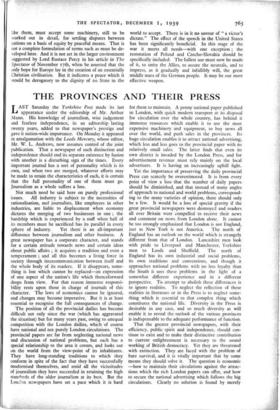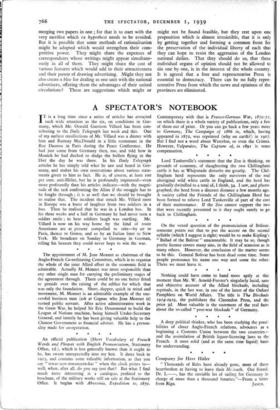THE PROVINCES AND THEIR PRESS L AST Saturday the Yorkshire Post
made its last appearance under the editorship of Mr. Arthur Mann. His knowledge of journalism, wise judgement and fearless independence, in an editorship lasting twenty years, added to that newspaper's prestige and gave it nation-wide importance. On Monday it appeared. in amalgamation with the Leeds Mercury, whose editor, Mr. W. L. Andrews, now assumes control of the joint publication. That a newspaper of such distinction and independence should end its separate existence by fusion with another is a disturbing sign. of the times. Every important journal has a sort of personality which is its own, and when two are merged, whatever efforts may be made to retain the characteristics of each, it is certain that the full personality of one of them must go. Journalism as a whole suffers a loss.
Not much need be said here on purely professional issues. All industry is subject to the necessities of rationalisation, and journalists, like employees in other industries, are liable to displacement when economy dictates the merging of two businesses in one ; the hardship which is -experienced by a staff when half of its members must be sacrificed has its parallel in every sphere of industry. Yet there is an all-important difference between journalism and other business. A great newspaper has a corporate character, and stands for a certain attitude towards news and certain ideas about public affairs ; it acquires a tradition and even a temperament ; and all this becomes a living force in society through intercommunication between itself and the whole body of its readers. If it disappears, some- thing is lost which cannot be replaced—an expression of one aspect of the nation's life which thenceforward drops from view. For that reason immense responsi- bility rests upon those in charge of journals of this character. The laws of economics cannot be ignored, and changes may become imperative. But it is at least essential to recognise the full consequences of change.
The position of all the provincial dailies has become difficult not only since the war (which has aggravated the situation) but for many years past, owing to unequal competition with the London dailies, which of course have national and not purely London circulations. The provincial papers are far from neglecting national news and discussion of national problems, but each has a special relationship to the area it covers, and looks out on the world from the view-point of its inhabitants. They have long-standing traditions to which they conform in spite of the fact that they have successfully . modernised themselves, and amid all the vicissitudes of journalism they have succeeded in retaining the high standards of the older journalism at its best. But the London newspapers have set a pace which it is hard for them to maintain. A penny national paper published in London, with quick modern transport at its disposal for circulation over the whole country, has behind it immense resources which enable it to use the most expensive machinery and equipment, to buy news all over the world, and push sales in the provinces. Its huge circulation enables it to attract national advertising, which less and less goes to the provincial paper with its relatively small sales. The latter finds that even its own district is invaded by the London Press, and for advertisement revenue must rely mainly on the local advertisers. It is having an increasingly uphill fight.
Yet the importance of preserving the daily provincial Press can scarcely be overestimated. It is from every point of view a loss that the number of daily papers should be diminished, and that instead of many angles of approach to national and world problems, correspond- ing to the many varieties of opinion, there should only be a few. It would be a loss of special gravity if the great provincial newspapers were destroyed and readers all over Britain were compelled to receive their news and comment on news from London alone. It cannot be too strongly emphasized that London is not England, just as New York is not America. The north of England has an outlook on the world which is strangely different from that of London. Lancashire men look with pride to Liverpool and Manchester, Yorkshire men to Leeds and Sheffield. The north of England has its own industrial and social problems, its own traditions and conventions, and though it approaches national problems with no less loyalty than the South it sees these problems in the light of a somewhat different experience and in a different perspective. To attempt to abolish these differences is to ignore realities. To neglect the reflection of these realities in literature or in the Press is to neglect some- thing which is essential to that complex thing which constitutes the national life. Diversity in the Press is desirable in any case, and so much diversity as will enable it to reveal the outlook of the various provinces is indispensable to the adequate performance of function.
That the greater provincial newspapers, with their efficiency, public spirit and independence, should con- tinue to exist and to make their distinctive contribution to current enlightenment is necessary to the sound working of British democracy. Yet they are threatened with extinction. They are faced with the problem of bare survival, and it is vitally important that by some means they should solve it. The question is economic —how to maintain their circulations against the attrac- tions which the rich London papers can offer, and how to secure the national advertising which follows the big circulations. Clearly no solution is found by merely merging two papers in one ; for that is to start with the very sacrifice which ex hypothesi needs to be avoided. But it is possible that some methods of rationalisation might be adopted which would strengthen their com- petitive power. They might share the expenses of correspondents whose writings might appear simultane- ously in all of them. They might share the cost of various features which would add to their attractiveness and their power of drawing advertising. Might they not also create a bloc for dealing as one unit with the national advertisers, offering them the advantages of their united circulations? These are suggestions which might or might not be found feasible, but they rest upon one proposition which is almost irresistible, that it is only by getting together and forming a common front for the preservation of the individual liberty of each that they can hope to resist the aggression of the London national dailies. That they should do so, that these individual organs of opinion should not be allowed to die one by one, is in the interest of the whole country. It is agreed that a free and representative Press is essential to democracy. There can be no fully repre- sentative Press from which the news and opinions of the provinces are eliminated.













































 Previous page
Previous page